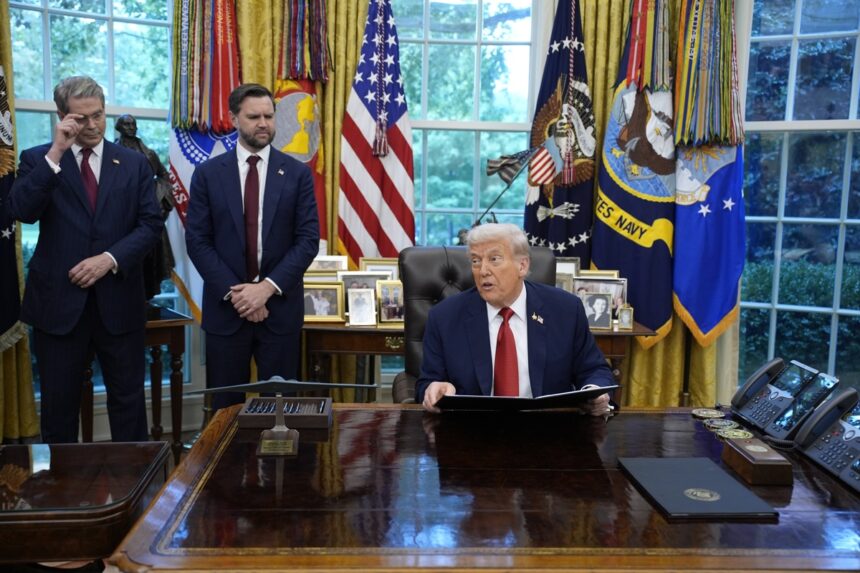U.S. President Donald Trump signed an executive order Thursday, Sept. 24, instructing Attorney General Pam Bondi to seek the death penalty in all cases prosecuted in Washington D.C. that meet the “applicable factors” set forth in federal law.
The measure seeks to reinstate a punishment that had been abolished in the country’s capital in 1981.
A measure within the framework of the “federal takeover”
DEATH penalty now FULLY ENFORCED in Washington DC
Trump signs memo
‘OK. Everybody understand?’ pic.twitter.com/SjIXN35AD3
– RT (@RT_com) September 25, 2025
The decision is part of Trump’s strategy to assume direct control over public safety in the capital, after declaring that the city faces an “unchecked crime” crisis.
Since last August 11, the federal administration took command of the D.C. Metropolitan Police.
It deployed thousands of elements of the National Guard and federal agencies such as the FBI, the Marshals Service and the Border Patrol in joint operations.
Trump has defended these actions by asserting that homicide, armed robbery and drug trafficking rates have reached alarming levels in the capital.
Critics point out, however, that official statistics do not fully support this narrative and that the measure represents an attempt to consolidate federal power in territories historically administered by local governments.
Reviving capital punishment in the capital
Washington D.C. abolished the death penalty in 1981, becoming one of the first jurisdictions in the country to eliminate this punishment.
However, Trump’s order mandates that the U.S. Attorney’s Office for the District of Columbia seek capital punishment in all federal cases that fall under crimes of particular gravity.
This would be in terrorism-related murders, multiple homicides, murders of federal agents or crimes considered “extreme violence.”
The memorandum signed by the president states that the application of the death penalty should be considered a “national priority” in the capital.
This at a time when Trump seeks to reinforce his “law and order” discourse ahead of the 2026 electoral process.
Criticism from human rights defenders
The measure has generated strong opposition from civil rights organizations and immigrant advocacy groups.
Spokespersons for the American Civil Liberties Union (ACLU) called the order an attempt to “use fear of crime to justify unconstitutional policies.”
They also recalled that the death penalty has been abolished in more than half of the states in the country and that there are multiple studies that question its effectiveness as a crime deterrence tool.
They also stressed that the judicial processes in which this punishment is applied often show racial and socioeconomic inequalities, with a greater impact on minorities, including Latinos and African-Americans.
National context and comparisons
Trump’s decision in Washington D.C. does not come in a vacuum.
In recent months, the president has used the same “cities in crisis” discourse to justify attempts at federal intervention in Chicago and Los Angeles, both governed by Democrats.
In his narrative, he claims that these cities have become examples of the failure of local policies and has promised that under his federal command order will be imposed “at any cost.”
For critics, these actions reflect an unprecedented centralization of power that could extend to other cities with high concentrations of immigrant populations, raising concerns among Latino communities.
For immigrants and Hispanic families residing in Washington D.C. and other cities under increased federal scrutiny, the reinstatement of the death penalty is perceived as a troubling sign.
Not only does it revive a punishment considered extreme by much of the world, but it is also inserted in a political context of tightening immigration and security policies.
Trump’s executive order thus represents a historic turning point in the nation’s capital and a new front in the legal and political battle that will define the course of criminal justice in the United States for years to come.
Filed under: Death penalty in Washington














